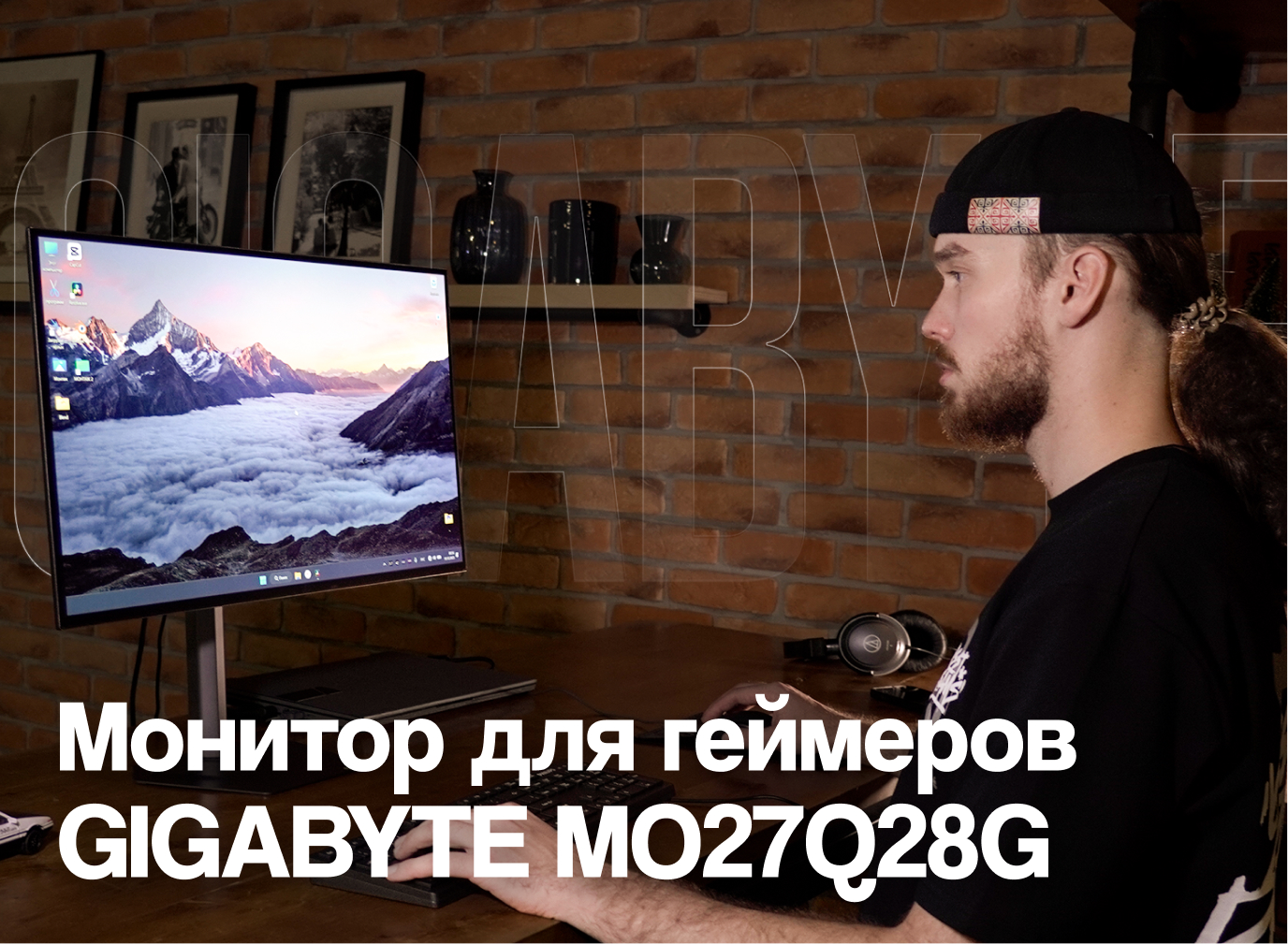Sellers on marketplaces face some big challenges. Some invest millions and can’t sell their products, while others struggle to balance e-commerce with their day jobs. With seven years of experience in the marketplace industry, Daulet Batyrbek has seen it all. During this time, he became an official retailer for Marvel and even reached out to Jeff Bezos about issues with Amazon. With this wealth of experience, Daulet decided to become a modern-day Prometheus—bringing fire to the people—and founded Prometei. This B2B aggregator connects sellers with suppliers and marketplaces. In an exclusive interview with ER10 Media, he shared how his startup is solving some of the biggest problems in e-commerce.
Follow Kazakhstan’s Startup Movement in the "100 Startup Stories of Kazakhstan", a collaborative project by ER10 Media and Astana Hub. This initiative highlights the most innovative Kazakh startups, showcasing projects that stand out for their creativity and impact. Among the heroes are Astana Hub residents, as well as creators of other innovative technological products and services. The content is available in Kazakh, Russian and English.
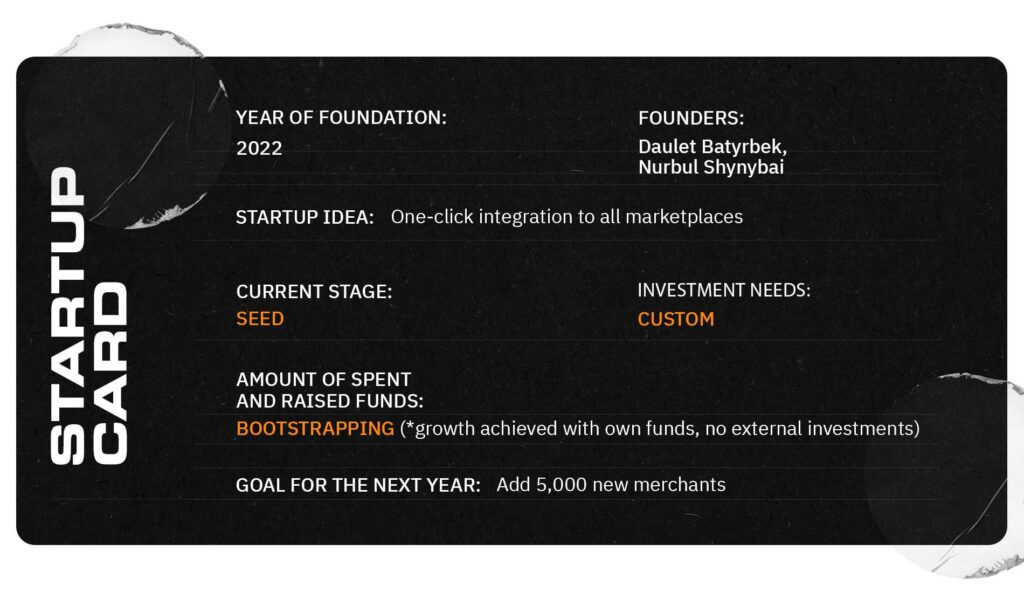
Why Marketplaces Are the Real Moneymakers
— What were you doing before you started Prometei?
— I’ve been selling on marketplaces for seven years now. Before launching Prometei, I was actively selling in the U.S. on Amazon, eBay, and Shopify. I’d ship products from China to California and sell them across the U.S.
— What do you find appealing about marketplaces?
— Before I got into marketplaces, I was running “Coffee to Go” shops. It was a solid operational business. After selling the shops and making a good profit, I moved into tenders, which were even more profitable. Then I met a Chinese team of four who were making $5 million selling on marketplaces, and I realized this was an even better opportunity. I dove into the field and discovered that marketplaces handle all the shipping. All I had to do was send products to their warehouses in advance. At the time, Kazakh citizens couldn’t officially sell on Amazon, so I even DM’d Jeff Bezos on Instagram to ask him to change that. Eventually, through a legal entity, I managed to break into the marketplace game.
— So Prometei isn’t competing with marketplaces; it’s helping them?
— Exactly. Prometei helps both sellers who sell on marketplaces and suppliers who provide goods for these platforms.
Sell First, Buy Later
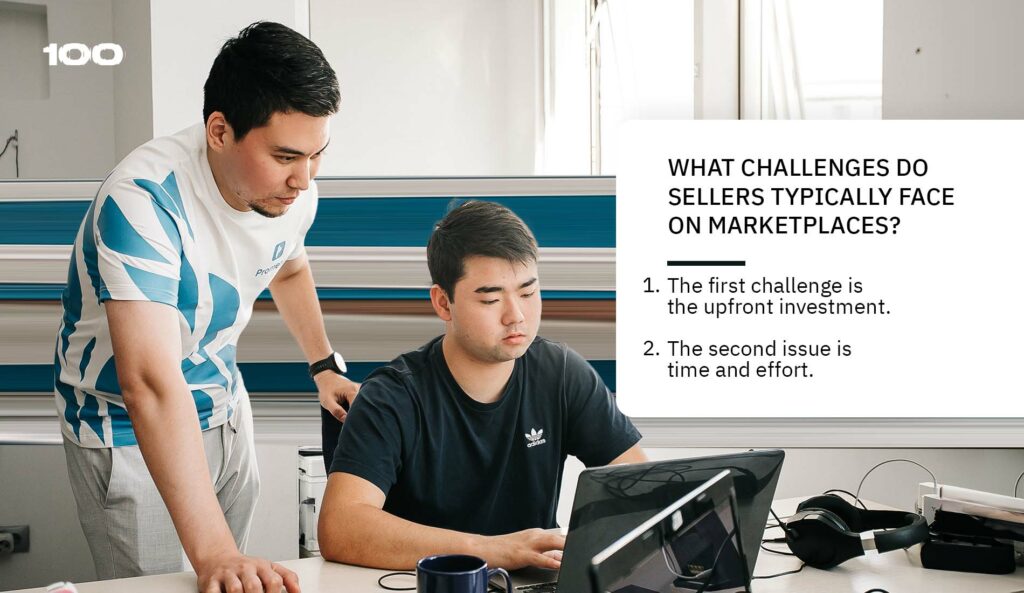
— What challenges do sellers typically face on marketplaces?
— The first challenge is the upfront investment. For example, ordering products from China, Turkey, or India requires a minimum purchase of $7,000–10,000. Some local electronics distributors of well-known brands have minimum orders of 25 million tenge. If you’re a beginner, you might not have the funds to make that kind of purchase.
The second issue is time and effort. When someone orders from China, they invest a large amount of money and store the products at home, unsure if they’ll sell. You’ve already spent $10,000, and now you have to pay for marketplace training, label barcodes, pack products daily, and stand in line to drop them off at the warehouse. But how do you find time for all that if you have a regular job?
— How does Prometei solve these problems?
— Prometei makes the entire process easier—from investment to delivery to the final customer. By subscribing to our platform, users get access to thousands of suppliers and half a million products with ready-to-use photos and descriptions. You don’t need to make a huge investment. With Prometei, you can buy even a single unit at wholesale prices.
Once you choose the products, you upload them to your online store with your markup. When you get an order, you process it through us: you sell first, then buy. This is the dropshipping model—there’s no need to worry about holding inventory. Our couriers handle the packing and delivery, so you can focus on other things while still earning on marketplaces.
— How does Prometei make money?
— We (the Prometei team) earn from platform services. Aside from suppliers, we also generate revenue from subscriptions and by offering automation tools. Normally, adding a product to a marketplace manually takes 40 minutes, but our service can upload 1,000–5,000 products in seconds.
"I Decided to Bring the Fire to the People"
— When did you come up with the idea for Prometei?
— While selling in the U.S., I experimented with different approaches. I launched my own brands and sent them to China, resold products across different marketplaces (a method called online arbitrage), and even worked with official distributors. For example, I was an official retailer for brands like Marvel, Hasbro, and DC Comics, selling toy products on Amazon. After testing several models, I realized that dropshipping was an ideal model—it allows for fast growth and automation of processes. When I brought the concept to Kazakhstan, I became a technical partner for platforms like Satu.kz, OZON, and others. As my experience grew, business schools like SDU Business School and other academies invited me to speak as an expert. At that time, my Instagram blog started gaining organic followers, and people kept asking me the same questions about shipping and suppliers. By then, I had already built a platform to automate updating and adding products for myself, which gave me the idea to use it to help others. I decided to scale up the supplier network, take on delivery and customer management, and offer the platform to users via subscription, following a training period. I took care of all the operational aspects and named the startup Prometei because, like Prometheus, I wanted to bring the fire to the people.
— Do you have a team?
— Yes. My co-founder, Nurbol Shynybai, is responsible for marketing. We also have an in-house team of IT specialists, developers, and a group of trackers. These are people who successfully run their own stores on marketplaces and offer mentorship services. Each marketplace expert guides users at every step, teaching them how to increase sales, optimize SEO, and more. We also have a B2B sales team that works with suppliers.
Big Scale, Big Control
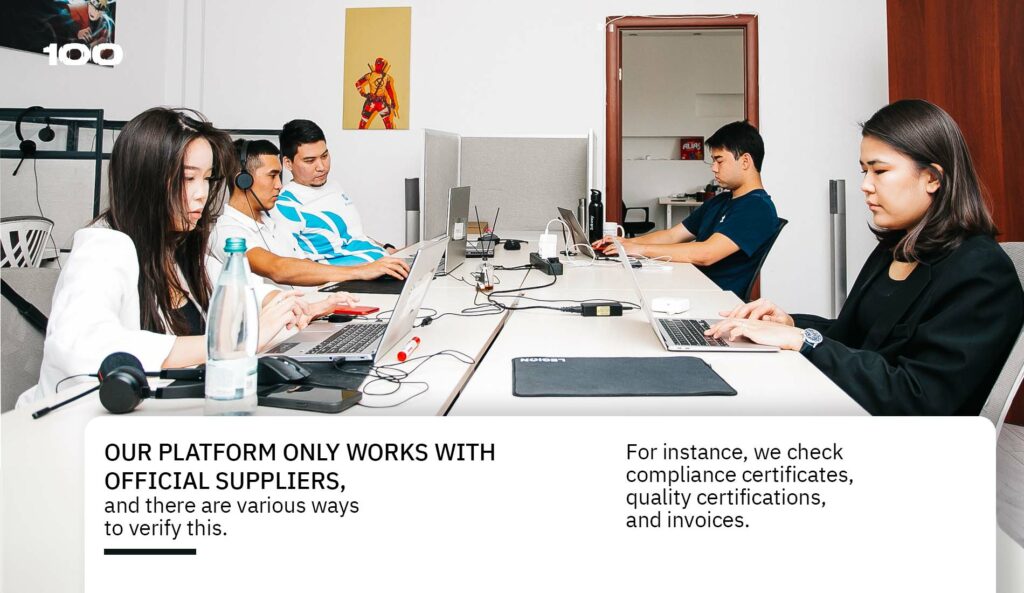
— How do you verify product licenses and ensure they’re of good quality?
— Our platform only works with official suppliers, and there are various ways to verify this. For instance, we check compliance certificates, quality certifications, and invoices. These documents and their presence can confirm that a supplier has legally imported the product into Kazakhstan and is officially distributing it. Of course, some sellers are tempted to bring in unlicensed products and resell them, but that’s a short-term strategy. You might make quick money, but you could lose your store if the rights holder files a complaint. From the start, I prepared to operate on a large scale, which is why I only work with official suppliers.
— Do you work with handmade or unbranded products, like original designs or crafts?
— Not yet. The products on our platform are the ones that sell well on marketplaces. We conduct thorough analytics before adding suppliers, and they analyze their specific sectors. These people are called category managers—if they sell blenders, for example, they are deeply immersed in the blender market. They know the different types, trends, and what international customers are buying most. We have over 200 brands and half a million product units—from cosmetics and toys to books, garden tools, and hardware.
— Which products or categories are most popular?
— There are always in-demand products, like dryers, hairdryers, mops, and kitchen items. In summer, seasonal products like pools and accessories, swimming goggles, etc., sell really well. However, as we move into fall, those items won’t sell much until spring. By August, people are already preparing for holiday shopping.
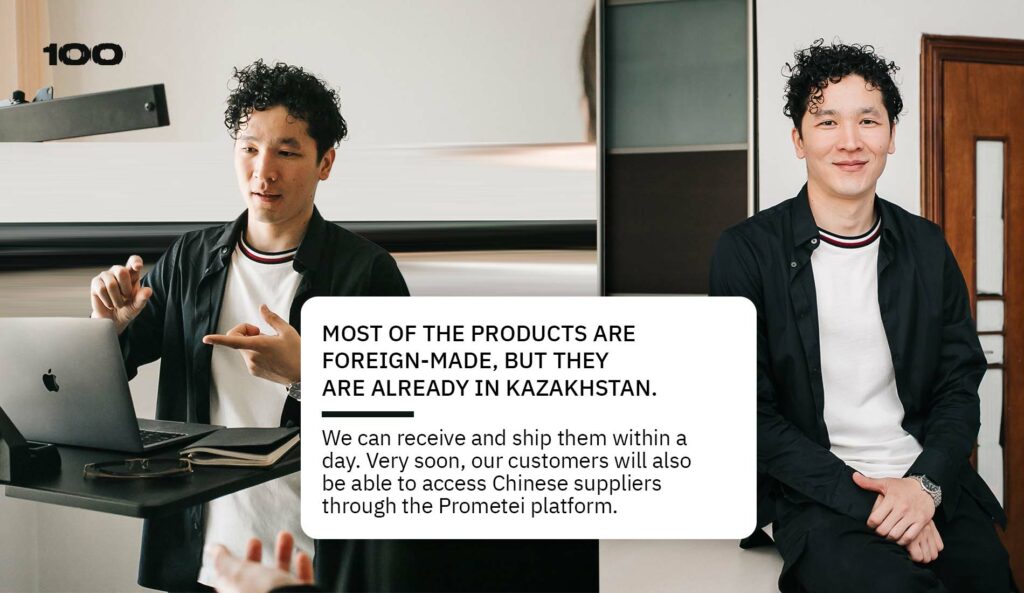
— Are most of the products on your platform from foreign or Kazakhstani suppliers?
— Most of the products are foreign-made, but they are already in Kazakhstan. We can receive and ship them within a day. Very soon, our customers will also be able to access Chinese suppliers through the Prometei platform. We don’t plan to make money from the products themselves. Our goal is to become an aggregator that helps people find suppliers and manage all the operational processes. The aggregator will even include logistics companies that handle end-to-end delivery with customs clearance. This feature is currently in development, so expect millions of products to be available soon!
— Where are you currently operating, and what markets are you targeting?
— Right now, our clients are all in Kazakhstan. But through the Google for Startups accelerator program at Astana Hub, which we were selected for, we’re working on expanding to Uzbekistan and Kyrgyzstan. These countries are officially on platforms like Wildberries and Ozon, and in Uzbekistan, the marketplace Uzum is gaining momentum. The recent push by Kaspi bank to enter the Uzbek market and acquire the Umo payment system is a strong indicator. E-commerce penetration in Uzbekistan is lower than in Kazakhstan, but the market has huge potential. We’ve run the numbers, analyzed the data, and forecasted that it’s a very promising market. We’ve already found partners to help us with this expansion.
Picking Up Speed
— Are you seeking investment?
— Our project is 2.5 years old, and so far, we’ve grown solely through profitability without outside investment. But now, we’ve realized that we need to scale quickly, so we’ve opened an investment round. Speed is critical in IT startups, so we’ve begun talks with several funds and already received some commitments.
— How much investment are you looking for?
— That’s something we discuss directly with investors. But one thing I can say for sure is that “smart money” would be a big advantage for us. An investor who can help us expand would be especially valuable. We’re eyeing Indonesia because it has a population of over 200 million and a well-developed e-commerce sector. There’s no single dominant player, and all marketplaces compete with each other, making our solution a perfect fit. However, we plan to enter Indonesia in about a year because we still haven’t reached even five percent of our potential in Kazakhstan. Right now, we’re working on pilot projects with banks.
— How soon do you plan to scale?
— Uzbekistan and China are our next targets for the coming year. We like to set ambitious goals.
All About Focus
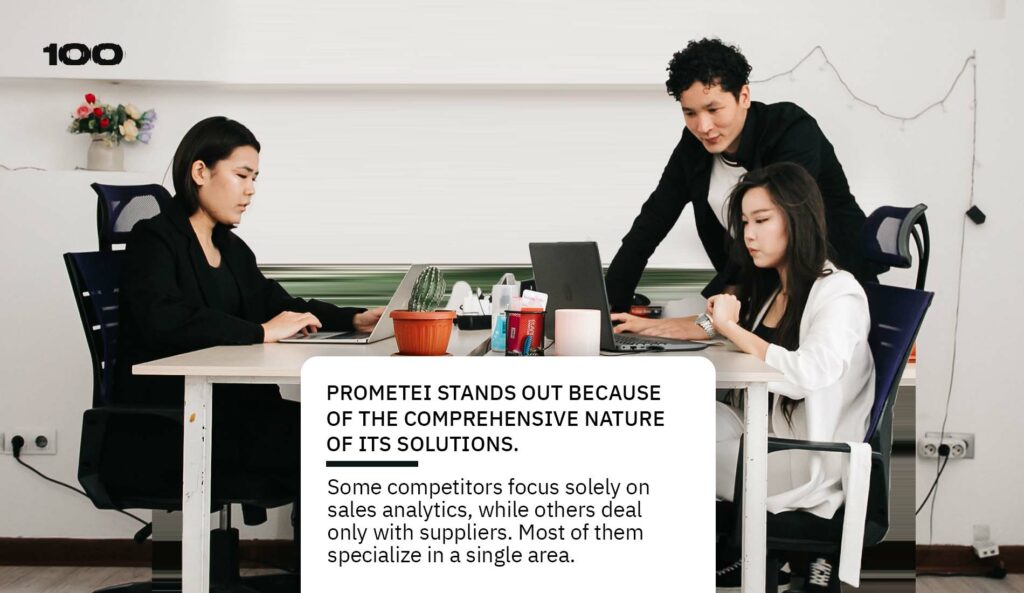
— Who are your competitors, and how do you stand out?
— Prometei stands out because of the comprehensive nature of its solutions. Some competitors focus solely on sales analytics, while others deal only with suppliers. Most of them specialize in a single area. However, our closest competitor, Modalyst, was acquired by Wix and now has a market cap of $6 billion. Huge respect to them—they’ve done an impressive job, and we can see that. But in Kazakhstan, there’s no competitor with a business model like ours. There were some, but they’ve since shut down.
— What mistakes did those who shut down make that you’re avoiding?
— I’m not entirely sure what mistakes they made, but I suspect it wasn’t their main business focus. For instance, I closed and sold all my online stores and reinvested the money into developing Prometei. In this way, I became my own first investor.
— That sounds risky. How did you handle finances in the early stages?
— It did take some time for development and preparation, but once we launched, we were profitable in the very first month. I believe that strong preparation and prior experience running my own online stores contributed to our success. After that, the key was figuring out how to scale this idea to a wider audience.
The Power of Solving Pain Points
— Tell us more about the preparation phase.
— The first step was customer development. People began asking questions and showing genuine interest. Test sales confirmed that people were excited about what we were offering. I quickly identified the pain points we were solving. Many people came to me saying, “I spent 1.5 million tenge on courses, but I’m not seeing any results.” It turned out that they were working full-time jobs while trying to learn how to make money on marketplaces. In their minds, running a business seemed easy, but they weren’t dedicating enough time to it because of their day jobs. Naturally, under those conditions, major results are hard to achieve. Sure, they could make sales, but millions? Unlikely. Pinpointing these issues allowed us to test our concept, which proved our hypothesis and led to sales. Then, we prepared for the project launch and focused heavily on marketing since the IT side was already in place.
— What’s your mission?
— We want to make e-commerce accessible to everyone through innovative products and services.

— What sport do you associate yourself with?
— The first thing that comes to mind is the Olympic torch relay—someone running with the torch, carrying the fire, just like Prometheus. Our startup also feels like long-distance running. E-commerce is evolving so rapidly, and the deeper we dive into our business, the more avenues and opportunities we discover that we didn’t even know existed before.




